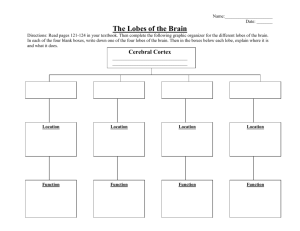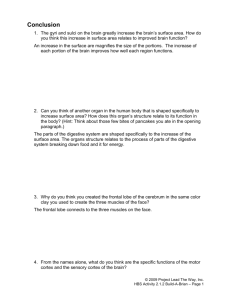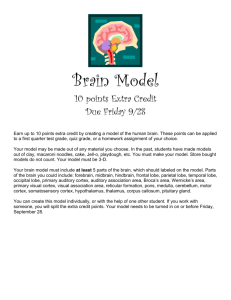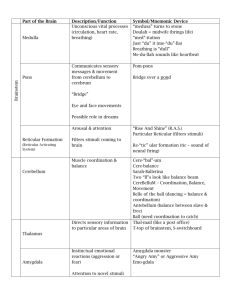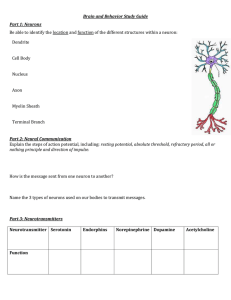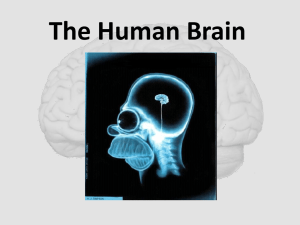Brain Anatomy
advertisement
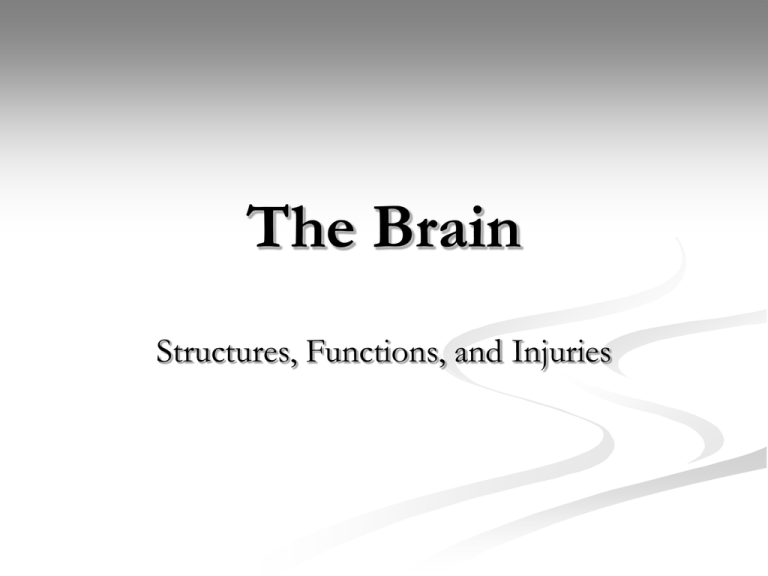
The Brain Structures, Functions, and Injuries The Brain “Older” brain networks sustain ______________ functions, and enable memory emotions, and basic drives Newer neural networks within the cerebrum – the two large hemispheres that contribute 85% of brain’s weight are associated with: Perceptions, Thinking, Speaking The Cerebral Cortex Cerebral Cortex: a thin surface layer of interconnected neural cells, covers cerebrum “Brain’s Thinking Crown” Ultimate control and information-processing center How does our cerebral cortex separate us from other animals? Structure of the Cortex Cerebral Cortex: contains 20-23 billion nerve cells – 300 trillion synaptic connections Glial Cells: cells that support, nourish, and protect neurons Neurons = Queen Bees Glial Cells = __________ Structure of the Cortex Each brain hemisphere is divided into four lobes that are separated by prominent fissures. These lobes are the: ___________ lobe (forehead) __________lobe (top to rear head) ________ lobe (back of head) __________ lobe (side of head). The Cerebrum: Two Hemispheres, Four Lobes Four Lobes: each lobe carries out many functions and many functions require interplay of several lobes Occipital – associated with visual processes Parietal –associated with sensory input for touch and body position Temporal – hearing and balance Frontal – muscle movement, decision-making, planning, & speaking Responsible for the ability to “see” or be aware of ourselves, reexperience past events, come up with strategies or plans, interpret what is going on in the world around us, and tell us what to do and feel. Motor Functions 1870, Fritsch & Hitzig Electrical stimulation to parts of a dog’s cortex Could make parts of body move Stimulating parts of this region in left or right hemisphere caused movements of body parts on opposite side of the body Discovered motor cortex: area at rear of frontal lobes that control voluntary movements Functions of the Cortex The Motor Cortex is the area at the rear of the frontal lobes that control voluntary movements. ___________ messages out to the body The Sensory Cortex (parietal lobe) __________ information from skin surface and sense organs. Sensory Cortex Sensory cortex: Area at the _______ of the parietal lobes Registers and processes body touch and movement sensations If neurosurgeons stimulate point: On top of this band of tissue, a person may report being touched on the ____________ On side of this band of tissue, a person may report being touched on their ___________ Sensory Cortex Sensory cortex: There are various areas in brain where cortex receives input from Visual information in visual cortex in occipital lobes, at the _________ of your brain Bash in the back of your head can make you ___________or stimulating it you might see flashes of color Association Areas Association Areas: areas of cerebral cortex, involved in higher mental functions such as: . . . . Association Areas Association Areas: Not involved in primary motor or sensory function Account for _____ of cerebral cortex Link sensory inputs with stored memories Interpret, integrate, and act on information processed by sensory areas Association Areas Association Areas: Found in all four lobes: Frontal Lobes: association areas enable judgment, planning, and processing of new memories Which of these would damage to frontal lobe affect? Intact Memories Planning ahead to bake a cake High Scores on IQ tests Cake baking skills Association Areas Frontal lobe damage can also alter personality: Removing inhibitions Moral judgments unrestrained Phineas Gage Effects of Other Brain Injuries: Phineas Gage Gage was a railroad construction foreman An 1848 explosion forced a steel tamping rod through his head Others said he was “no longer Gage” Lost his job, worked as a sideshow exhibit Gage’s Injuries and Symptoms The rod pierced through his frontal lobe and exited out the top of his skull. Remarkably enough, he survived because none of the vital parts that control breathing, movement or physical control had been damaged. However, other major changes were noticed as a result of the accident. Gage, a usually friendly and normal person, suddenly began to swear frequently, undress whenever he felt like it, urinate in public, and have temper tantrums. The case of Phineas Gage suggests that our frontal lobe plays a large part in social control and personality, and demonstrates the severe effect any type of brain injury can have. Phineas Gage video link (#25): http://www.learner.org/reso urces/series142.html Figure 2.28 Phineas Gage reconsidered Myers: Psychology, Ninth Edition Copyright © 2010 by Worth Publishers Association Areas Must be wary of using pictures of brain “hot spots” that locate complex functions in precise brain areas Parietal Lobes: enable mathematical & spatial reasoning Temporal Lobes: facial recognition Prosopagnosia Very complex mental functions DO NOT reside in any one place Memory, language, attention result from synchronized activity among distinct brain areas Language • Aphasia is an impairment of language, usually caused by left hemisphere damage either to Broca’s area (impaired speaking) or to Wernicke’s area (impaired understanding). Broca’s Area Receives impulse from Wernicke’s Area and converts it into motor commands. Damage: disrupts speaking Person can understand language Words may not be properly formed Speech is slow and slurred. Patients may get frustrated because they know that something is wrong. Wernicke’s Area The area in our brain that allows understanding of spoken and written language. It is the part that enables a person to interpret language, so damage to this part causes the person to become unaware of his own speech and the speech of others. Sometimes the person can speak clearly, but the words that are put together make no sense. This way of speaking has been called "word salad" because it appears that the words are all mixed up like the vegetables in a salad. Might use complete nonsense words. Often not aware of their problem.
